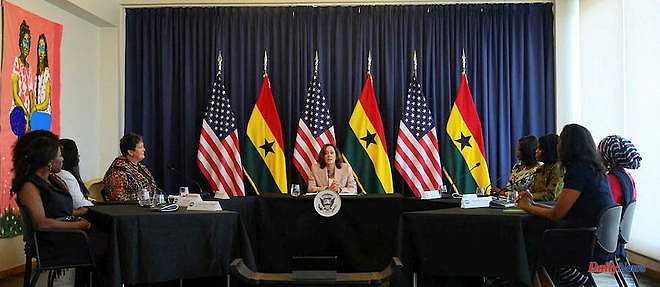U.S. Vice President Kamala Harris wrapped up a multi-day visit to Africa on Sunday (April 2), which took her to Ghana, Zambia and Tanzania. A tour during which she announced significant public and private investments in African women, particularly in favor of their empowerment and in the key digital sector.
"We believe that the investments I have described will help build a future where women are not only treated equally but are able to thrive, where women have the opportunity to lead, and a future where there will be no barriers to women's ability to participate in the economy, where they can be free from violence and have equal access to health care and education, and where they can shatter all glass ceilings," Kamala Harris said last Wednesday from Ghana's capital, Accra, in an exchange with a group of women entrepreneurs in fields such as medicine, agriculture, climate, economy and culture. The meeting was held at the Mix Design Hub, a well-known restaurant that doubles as a gallery and coworking space.
These major announcements come after a United States-Africa summit in December in Washington, during which President Joe Biden called for a broad partnership with Africa, as the United States seeks to assert its presence on the continent in the face of the growing influence of China and Russia.
In order to stand out, one avenue for Washington is to make women's empowerment a key part of its discourse. The White House starts from an observation: the African continent is ahead of the rest of the world in terms of the number of active women and even entrepreneurs. Indeed, according to the World Bank, their participation rate in the labor market is 55%, higher than that observed in the most advanced countries, 53%, and the world average, 48%.
We are investing in the innovations and ideas of African women like the six inspiring entrepreneurs I met this week. Because when we lift up the status of women, we lift up their children, families, and communities, and entire societies benefit. pic.twitter.com/6OXYX58GCJ
They also stand out for the fact that they generally reinvest up to 90% of their income in the education, health and nutrition of their families and communities. At the same time, gender inequality costs Africa $95 billion a year. Vice President Harris called for more investment in innovation in Africa, particularly in the digital economy, good governance and democracy. "The focus is on both inclusion and leadership understanding that women must have the opportunity and access to whatever is necessary to achieve their goals, their desires, their potential, to also lead “, continued Kamala Harris.
The World Bank and the International Monetary Fund have long insisted that integrating women into economies creates jobs, improves living standards, boosts a country's growth and contributes to a country's peace and prosperity.
The African Women's Economic Empowerment Initiative includes nearly $400 million from the private sector "to help close the digital gender gap." Several American giants, including Microsoft, Visa, Pfizer, MasterCard and HP, have announced their contribution to the initiative. One of the challenges is to facilitate access to technology, since African women are less likely than men to have a mobile phone (9% less) and even less to use the Internet (48%) , according to the World Bank. “Improving the economic status of women and girls is not only a matter of human rights, justice and equity, it is also a strategic imperative that reduces poverty and promotes sustainable economic growth “, published the office of the American vice-president.
Still, while women in Africa are more likely to become entrepreneurs, they also face far more barriers than men to starting and running their businesses. And they are currently numerous: legal barriers that prohibit women's access to certain jobs, cultural barriers, difficulties in being taken seriously when they have not gone to school, and especially difficulties in obtaining a loan from banks. However, without access to funds, it is almost impossible to start a business.












